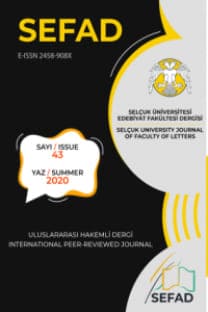PAUL AUSTER’IN THE MUSIC OF CHANCE ADLI ROMANINDA SINIRLANDIRILMIŞ KAHRAMAN VE ÖZGÜRLÜKTEN KAÇIŞ
Paul Auster önemli bir Amerikalı romancı, eleştirmen ve şair olmakla birlikte bu The Music of Chance adlı romanıyla Pen/Faulkner Kurgu Ödülünün Finalisti olmuştur. Romanın başkahramanı Jim Nashe ülke boyunca yeni almış olduğu arabasını kullanabilmek ve parasını tükenmek üzereyken para kazanabilmek için işini ve ailesini terk eden eski bir itfaiyecidir. Nashe ve O’nun tarafından bir otoyolun kenarından yaralı halde bulunan Pozzi isimli arkadaşıyla kolay para kazanabilmek için kumar oynamaya karar verirler fakat kaybettikleri için kumar borçlarını ödeyebilmek için “ağlama” duvarı yapmaya zorlanırlar. Öte taraftan Jim tutsaklığından önce bir başıboş olduğu için Auster Thomas Nashe’in pikaresk romanı The Unfortunate Traveller romanına atıfta bulunur. Eleştirmenler alegorik olarak hem ruhsal hem bedensel açıdan Jim’in ev hapsine değinirler. Jim’in etnik ve kültürel normları davranışlarını belirlemektedir. Etnik köken olarak Yahudi olan Auster Nazi Soykırımından neler çektiğini ve deneyimlerini bu romanda yansıtmaya çalışır. Jim Nashe’in yaşantı ve hayat tecrübeleri Holokost veya Pogrom’lardaki Yahudilerle benzerlikler arz eder. Başkahramanın/yazarın benzer özellikleri okuyucu adına karmaşık bir kurgu sunar. Çünkü okuyucunun hem yazarın yaşam ve kökeni hakkında hem de romandaki ince göndermeleri kavraması gerekir. Bir de bunu tarihsel ve günlük yaşama endekslemesi olayları biraz daha gerçekçi kılmaktadır. Ancak Auster bunu yaparken iki farklı karakterin problemlerle karşılaştığında aynı tepkiyi göstermesini gözler önüne serer. Bu çalışmada Jim’in bedensel ve ruhsal hapsi ve bunun nedenleri irdelenecektir.
Anahtar Kelimeler:
Jim Nashe, Paul Auster, Pikaresk, The Music of Chance
THE LOCALIZED HERO AND ESCAPE FROM FREEDOM IN THE MUSIC OF CHANCE BY PAUL AUSTER
Paul Auster is a prominent American novelist, critic and poet: he was a Pen/Faulkner Award for Fiction finalist for his novel, The Music of Chance. This book’s protagonist, Jim Nashe, is an ex-fireman who has left his job and family to drive around the country and to earn money while running out of money. He and his friend named Pozzi found wounded on the motorway by him decide to gamble to make money easily: yet they are trapped in a house and forced to make a “wailing” wall because of their gambling debts for their losing. On the other hand, because Jim was a vagabond before his enslavement, Auster invokes Thomas Nashe’s picaresque novel, The Unfortunate Traveller. Critics allegorically address Jim’s home confinement from both spiritual and physical perspectives. Jim’s ethnic and cultural foundations inform his behaviors. An ethnic Jew, Auster illustrates the suffering of Holocaust survivors. Jim Nashe’s experiences are similar to those of Jews in the Holocaust or the Pogroms. He lives in a space that limits his freedom: he prefers death to living this way. The same characteristics of protagonist/writer offer a sophisticated plot for readers. Because the reader must know both the writer’s life and novel’s witty nuance. In this study, we examine Jim’s incarceration and the reasons for it.
Keywords:
Jim Nashe, Paul Auster, Picaresque, The Music of Chance,
___
- AUSTER, Paul (1990). The Music of Chance. London: Faber and Faber.
- BARONE, Dennis (1995). “Introduction: Paul Auster and the Postmodern American Novel” Beyond the Red Notebook: Essays on Paul Auster. ed. Dennis Barone. Philadelphia: University of Pennsylvania Press. 1-26.
- BELLETTO, Steven (2012). No Accident, Comrade: Chance and Design in Cold War American Narratives. New York: Oxford University Press.
- BRAY, Paul (1994). “The Currents of Fate and 'The Music of Chance.' (Analysis of Paul Auster's Novel) (Paul Auster/Danilo Kis)”. The Review of Contemporary Fiction 14 (1): 83-85. https://www.questia.com/read/1G1-15073820/the-currents-of-fate-and-the-music-of-chance-analysis [27.06.2015].
- DOTAN, Eyal (2000). “The Game of Late Capitalism: Gambling and Ideology in the Music of Chance”. Mosaic 33 (1). https://www.questia.com/read/1G1-62383975/the-game-of-late-capitalism-gambling-and-ideology [27.06. 2015].
- IRVIN, Mark (1994a). “Inventing 'The Music of Chance.' (Analysis of Paul Auster's Novel) (Paul Auster/Danilo Kis)”. The Review of Contemporary Fiction. 14(1) https://www.questia.com/read/1G1-15073778/inventing-the-music-of-chance-analysis-of-paul [27.06.2015].
- IRVIN, Mark (1994b). “Memory’s Escape: Inventing The Music of Chance – A Conversation with Paul Auster”. Denver Quarterly 28 (3): 111-22.
- LITTLE, William G. & AUSTER, Paul (1997). “Nothing to Go on: Paul Auster's "City of Glass". Contemporary Literature 38 (1): 133-63.
- MCCAFFERY, Larry & GREGORY Sinda et al (1992). “An Interview with Paul Auster”. Contemporary Literature 33 (1): 1-23.
- MERIVALE, Patricia (1997). “L'Oeuvre de Paul Auster”. Contemporary Literature 38 (1): 185-97.
- SHILOH, Ilana & AUSTER, Paul (2002). “A Place Both Imaginary and Realistic: Paul Auster's "The Music of Chance". Contemporary Literature 43 (3): 488-517.
- VARVOGLI, Aliki (2001). The World That Is the Book: Paul Auster's Fiction. Liverpool: Liverpool University Press.
- WOODS, Tim (1995). “The Music of Chance: Aleatorical (Dis)harmonies Within 'The City of the World” Beyond the Red Notebook: Essays on Paul Auster. ed. Dennis Barone. Philadelphia: University of Pennsylvania Press. 143-161.
- Yayın Aralığı: Yılda 2 Sayı
- Başlangıç: 1981
- Yayıncı: Selçuk Üniversitesi Edebiyat Fakültesi
Sayıdaki Diğer Makaleler
PAUL AUSTER’IN THE MUSIC OF CHANCE ADLI ROMANINDA SINIRLANDIRILMIŞ KAHRAMAN VE ÖZGÜRLÜKTEN KAÇIŞ
KAMUSAL ALANDA DÖNÜŞEN YAPILAR: AGORADAN SANAL UZAMA
ISAURA ANTİK KENTİ OSTOTEKLERİ
POPÜLER ÇEVİRİ ÇOCUK ROMANLARININ İÇERİK BAKIMINDAN İNCELENMESİ
EDEBİYATA EKOELEŞTİREL YAKLAŞIMLAR: EKOŞİİR VE ELİF SOFYA
Meliz ERGİN, Özen Nergis DOLCEROCCA
KONYA ARKEOLOJİ MÜZESİNDEN BİR HERAKLES HEYKELCİĞİ: “HERAKLES EPİTRAPEZİOS”
Selçuk Üniversitesi Edebiyat Fakültesi Dergisi Yayım İlkeleri
OSMANLI DEVLETİ ZAVİYESİNDEN 1904-1905 RUS-JAPON HARBİ
ORJİNAL BİR KOPYA: KAZUO ISHIGURO’NUN NEVER LET ME GO ROMANININ FİLM UYARLAMASI
